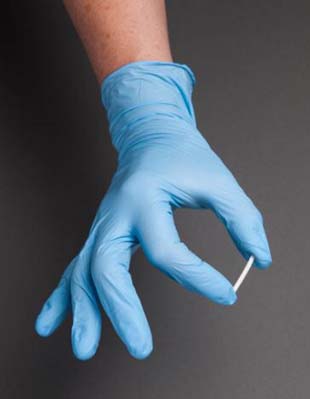FDA panel favors approval of implant to treat opioid addiction
A Food and Drug Administration committee voted today in favor of approval for an implant designed to help people beat opioid addictions.
The implant, probuphine, provides a steady dose of medication called buprenorphine, which is used to treat withdrawal symptoms and decrease cravings for opioids like heroin and prescription painkillers in addicts.
Currently, buprenorphine is available in pill form or in dissolvable strips, which the implant's manufacturer, Braeburn Pharmaceuticals, argues come with many shortcomings, including the fact that patients have to remember to take the daily doses themselves.
The company also notes that some buprenorphine users illegally sell their medication, and there's a risk that the drug may accidentally fall into the hands of children.
The implant lasts for six months and eliminates these problems, experts say. It consists of four small rods inserted just under the skin in the inner arm, releasing a steady dose of buprenorphine into a patient's system.
"It can help improve adherence to medication," Dr. Michael Frost, an addiction specialist who helped test the probuphine implants in clinical trials, told CBS Philadelphia last month.
The treatment "helps stabilize the brain chemistry and take away the cravings," he said.
The implant is coming up for FDA approval at a time when addiction to opioids has been deemed a national epidemic. According to the Centers for Disease Control and Prevention, deaths from prescription painkillers quadrupled from 1999 to 2013. Almost 44,000 drug overdose deaths in the United States occurred in 2013, with over 16,000 involving opioid painkillers.
Braeburn notes that the safety and effectiveness of probuphine implants has been analyzed in several clinical trials, including a 177-person study discussed at today's hearing. The participants were randomly assigned to be treated with either the probuphine implant or the dissolvable buprenorphine strips for six months. The results showed a 96 percent response rate for the implant, compared to 88 percent for the strips.
Additionally, 86 percent of implant patients showed no evidence of illicit opioid use during the six-month period, compared to 72 percent of the patients using the strips.
Patients who benefitted from the probuphine implants testified during Tuesday's advisory committee hearing.
"With this delivery method, all I have to focus on now is my new normal. I don't have to be reminded every day that I am a junkie every morning," a probuphine trial patient said. "I don't have to be reminded every day or every month when I look into the pharmacist's eyes and they say 'oh it's you again.'"
But some addiction specialists say probuphine may not be as safe as its manufacturers suggest.
At the hearing today, Dr. Tracy Rupp, a pharmacist and director of public health policy initiatives at the National Center for Health Research, said that there is not enough evidence to instruct doctors on how to safely transition patients to the implant.
She noted that it takes up to four weeks for probuphine to administer the same amount of medication as the strips, suggesting that patients would need to continue to take buprenorphine orally the first few weeks after getting the implant.
Rupp, who recommended against approval of the device, expressed concerned that this transition period could lead to a relapse. "This is an unacceptable risk for stable patients," she said.
She also noted that, as the implant requires a new incision every six months, patients face a risk of bleeding and infections.
In order to prescribe probuphine, doctors would need to undergo training in how to safely implant and remove medical devices.
The FDA is expected to make a final decision on whether to approve the implants by the end of February.

